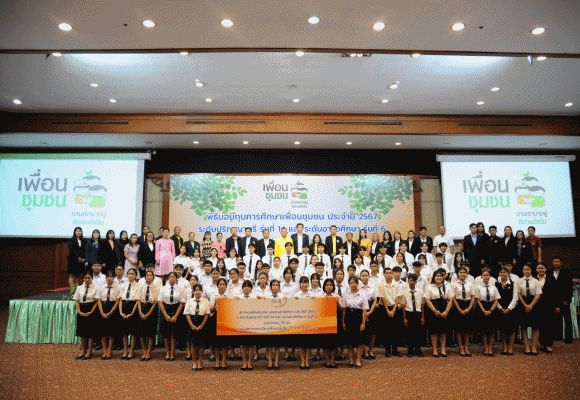- Details
- Category: การศึกษา
- Published: Tuesday, 26 April 2022 08:40
- Hits: 2352

การศึกษา: ประเทศไทยมีความเสี่ยงสูงสุดต่อเด็กในโลกออนไลน์
เรา (บริษัทรักษาความปลอดภัยทางไซเบอร์ Surfshark) ได้ทำการศึกษาเกี่ยวกับความปลอดภัยทางไซเบอร์ของเด็ก เราพบว่าเด็กในประเทศไทยมีความเสี่ยงต่อภัยคุกคามทางออนไลน์มากที่สุดรองลงมาคือเด็กในฟิลิปปินส์และตุรกี
การศึกษายังพบว่า:
- ญี่ปุ่น อิตาลี และสเปนอยู่ในอันดับต้น ๆ ที่มีการเปิดรับต่ำสุดทั่วโลก
- รายชื่อผู้นำของญี่ปุ่นในญี่ปุ่นอยู่ในอันดับสูง (3)ในด้านความสามารถของเด็กในการรับมือกับความเสี่ยงทางออนไลน์ – ในการตรวจจับและจัดการกับภัยคุกคามทางไซเบอร์ ประเมินผลกระทบ และสร้างรหัสผ่านที่รัดกุม
- ประเทศที่มีรายได้สูงเช่นซาอุดีอาระเบียและอุรุกวัยมีการศึกษาความปลอดภัยออนไลน์ที่ไม่มีอยู่จริง ในทางกลับกัน เด็กในประเทศแถบเอเชียแปซิฟิก (อินเดีย มาเลเซีย ญี่ปุ่น ออสเตรเลีย และนิวซีแลนด์) มีทักษะการจัดการความเสี่ยงทางออนไลน์ที่แข็งแกร่งที่สุด
- เด็กอายุ 8-12 ปี 6 ใน 10 คนกำลังเผชิญกับความเสี่ยงทางไซเบอร์ทางออนไลน์ ในปี 2020 เพียงปีเดียว ความสูญเสียทางการเงินต่อปีจากอาชญากรรมไซเบอร์ต่อเด็กสูงถึง660,000 ดอลลาร์สหรัฐ (ลดลง 32%) เมื่อเทียบ ปีต่อปี
เมื่อความเปราะบางของความเป็นอยู่ที่ดีของเด็กในโลกออนไลน์เติบโตขึ้น Aleksandr Valentij ผู้เชี่ยวชาญด้านความปลอดภัยทางไซเบอร์ได้แชร์เคล็ดลับ 6 ข้อในการพูดคุยเกี่ยวกับความปลอดภัยในโลกไซเบอร์กับบุตรหลานของคุณ สำหรับข้อมูลเพิ่มเติม
โปรดดูข่าวประชาสัมพันธ์ของเราที่นี่:
https://docs.google.com/
บางทีเรื่องนี้อาจจะน่าสนใจสำหรับคุณ?...
Thailand has the highest children’s exposure to online risks globally, the study shows
The country also has the 3rd worst result worldwide in children’s ability to cope with online risks
According to cybersecurity company Surfshark, children in Thailand are the most exposed to online threats globally. The country is followed by the Philippines and Turkey, while Japan, Italy, and Spain rank on the top list, having the lowest exposure worldwide.
The study also shows that Thailand has the 3rd worst result in children's ability to cope with online risks, following only Uruguay and Saudi Arabia. This means that local kids don't have the sufficient skills to deal with cyberbullying or other common cyberthreats – to detect and deal with cyber threats, evaluate their impact, and create strong passwords.
Managing exposure to online risks and developing abilities to cope with them have become increasingly important nowadays. Surfshark's study found that 6 out of 10 children ages 8–12 are exposed to cyber risks online globally. In addition, 1 in 2 children encounter cyberbullying, and close to one-third experiences other cyber threats such as phishing or hacking.
The number of cybercrimes against children steadily grew each year by 5–9% but sharply spiked by 144% in 2020, after roughly 1B school children worldwide were relocated online for remote learning. In 2020 alone, yearly financial losses from cybercrimes against children reached US$ 660,000 (YoY decrease by 32%).
To put it in perspective, in the US only, around 12M children were exposed to cyber risks, 9M were affected by cyberbullying, and 6M experienced cyber threats in the past three years.
Naturally, children in nations with the lowest online presence are the least likely to be cyberbullied or fall victim to cyber dangers such as phishing or even hacking. However, online safety education plays one of the most important roles in children's ability to cope with cyberbullying, phishing, and other cyberthreats.
"Through this study, we can see that educating children about cyberthreats plays a massive role in them knowing how to deal with any problems that may arise online. Every child is an individual. They all seek different things from their online experience, handling danger differently. There is no one-size-fits-all approach to discussing online safety with your children. Instead, you must discover ways to converse with them and assist them in understanding what to do", says Aleksandr Valentij.
Interestingly, low and lower-middle-income countries have better online safety education than the rich ones.
High-income countries like Saudi Arabia and Uruguay have basically non-existent online safety education, scoring 6.5 and 2 out of 100. Thus, it does not surprise that children in Saudi Arabia and Uruguay are the least prepared to deal with online threats.
On the other hand, children in Asia-Pacific countries (India, Malaysia, Japan, Australia, and New Zealand) have the strongest online risk management skills. India has 30% stronger online safety education programs than the global average, while Malaysia, Australia, and New Zealand have even stronger online safety education programs than India.
How to talk with children about online safety
As the vulnerability of children's well-being online grows, cybersecurity expert Aleksandr Valentij shares six tips on how to talk about cybersecurity with your kids:
Educate young children. Use child-friendly educational sources like the interactive cartoons. Educate children to avoid sharing personal information, photos, and videos online.
Discuss internet safety. Focus on empowering children, not scaring them when it comes to using the internet. Make sure your child knows what is safe to do online and what is not.
Build trust. Let your child know that they can approach you with any questions or concerns. Create a trusting, respectful environment by encouraging children to tell a parent or trusted adult if they encounter a cyberthreat.
Use cybersecurity tools. Use the right tools to help keep them safe (e.g., antivirus, VPN, content blocker, ad blocker, etc.). Help your child to run regular scans together with firewalls and email filters to further decrease the risks, such as ransomware.
Change passwords. If the password for your child's email or gaming platform gets leaked, help your child change it immediately. Even better is to use password managers to generate new passwords and avoid using weak ones.
Set up internet rules. Adjust privacy settings and use parental controls for online games, apps, social media sites, and other websites. Keep your computer in an open area and consider setting time limits on all devices.
NOTES TO EDITORS
Surfshark, a Gold winner at 2021 awards as the Most Innovative Security Service of the Year, is a privacy protection toolset developed to help its users control their online presence seamlessly. The main mission of Surfshark is to humanize online privacy protection and develop tools that protect users' privacy beyond the realm of a virtual private network. Surfshark is one of very few VPNs which have been audited by independent security experts.














































































